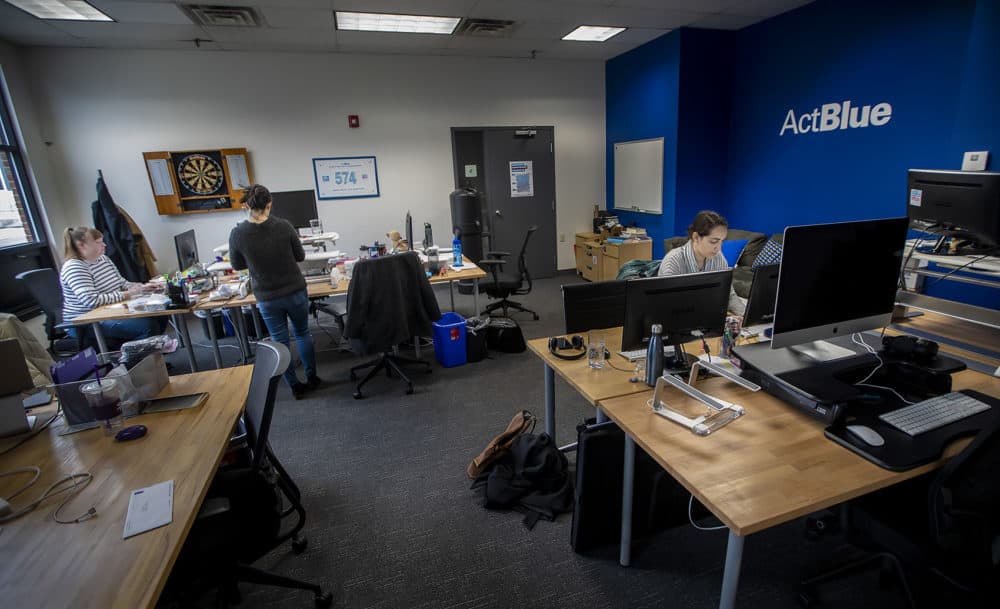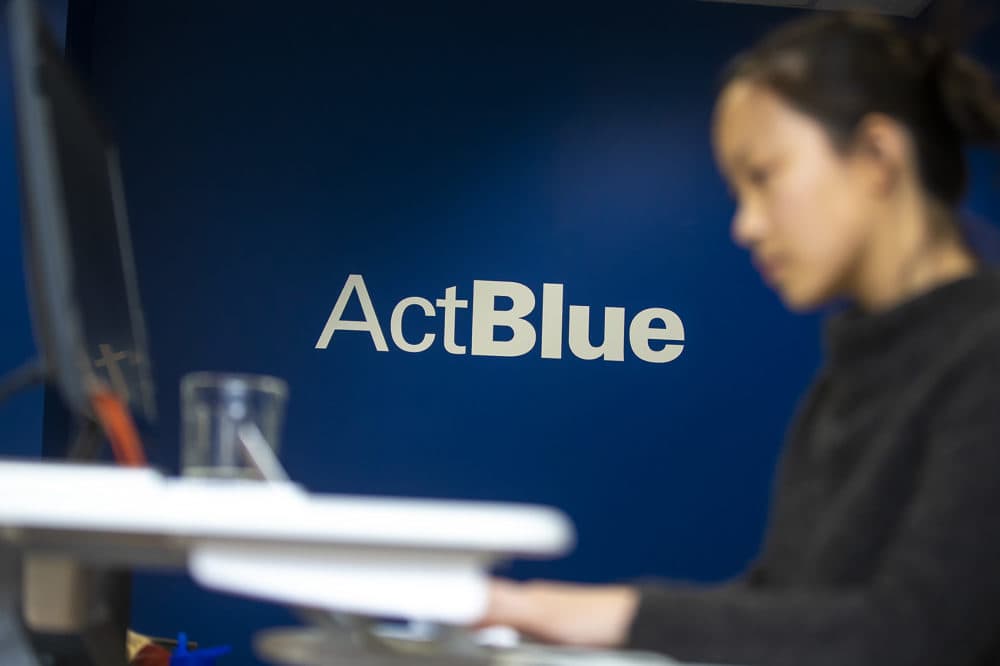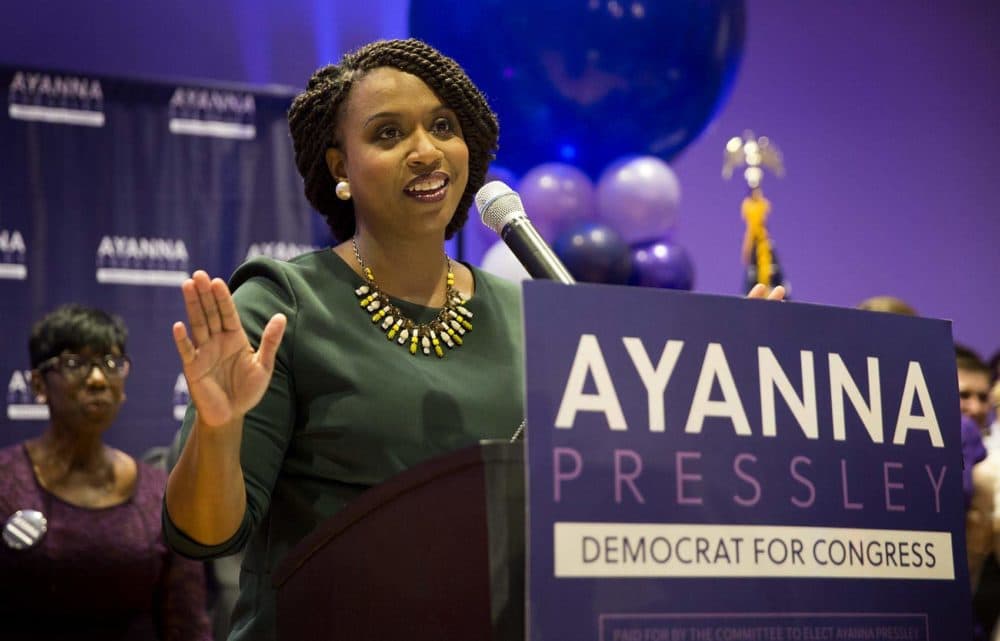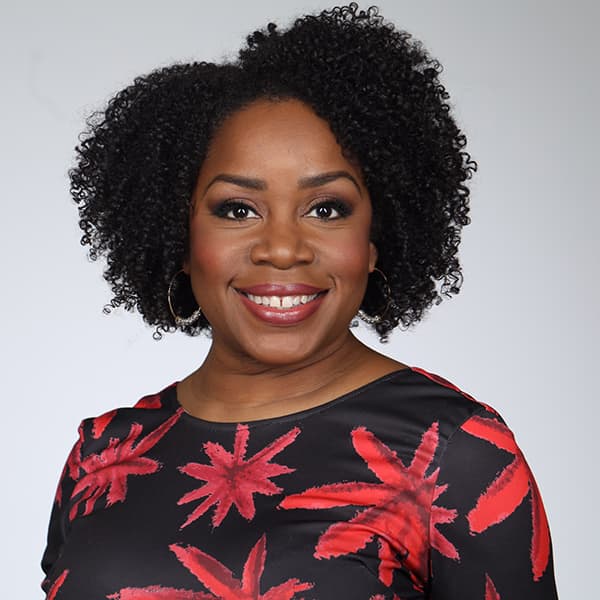Advertisement
Democrats' Billion-Dollar Fundraising Juggernaut Is Tucked Away In Somerville
Resume
The nondescript brick building that houses ActBlue’s headquarters in Somerville belies the nonprofit's mega-sized role in Democratic fundraising.
“We like to keep a low profile,” laughed Erin Hill, ActBlue’s executive director, as she walked through the loft office space near Davis Square, which has housed the 15-year-old organization since 2013.
But the group that helps Democratic candidates, organizations and charities bring in cash with easy-to-use online tools has become a political juggernaut.
Donors have given more than $3.3 billion using ActBlue — more than half of which has come in during and since the 2017-2018 election season. The average contribution is just shy of $40.
The simplicity demonstrated by the modest office fits right in with the group’s core mission, Hill said. And it goes back to its founding 15 years ago by MIT-educated computer scientist Matt DeBergalis and Harvard-trained physicist Benjamin Rahn.
"They built ActBlue with the idea of, could they harness technology to make it easier for more people to participate, and internalize all the complexity — kind of democratize the least democratic part of the democratic process, which was fundraising — and do that online?” Hill said. “And so they created ActBlue with that purpose."
That idea has revolutionized (big D) Democratic fundraising, giving candidates the ability to sidestep big-money donors and super PACs and bring in huge fundraising hauls, one small donation at a time. And all donors have to do is click a button on an email or a phone app.

Hill said the goal of the platform is not only to democratize campaigns by putting funding in the hands of voters, rather than special interest groups. But, she said, “it also makes it more possible for new people to run. If you don’t have to go through traditional power structures, if you can build your own grassroots base, people who might not have thought it was possible to run for office before suddenly have a path forward.”
U.S. Rep. Ayanna Pressley, who unseated longtime Somerville incumbent Michael Capuano last year, was one of many first-time congressional candidates who used ActBlue to compete in a new way.
"By forgoing the corporate PAC donations, it really gave us the bandwidth and credibility to speak on the real issues that people are facing in this community and have it resonate in a way that it might not have, were there questions about who are the folks driving this policy agenda," said Harry Shipps, Pressley’s campaign spokesman. He has also worked for other Democratic groups including the state Democratic Party.
Shipps said ActBlue’s value isn’t just its easy-to-use payment processing software. It’s the ability to tailor a candidate’s fundraising to the core message of the campaign. He said that values-based messaging fit perfectly with the way Pressley not only ran her campaign, but also the way she legislates.
He called Pressley’s proposal to lower the federal voting age to 16 “a values-based proposition that recognizes the activism and the advocacy that young people are taking on these days.”
“We are then able to take that values-based messaging about engaging these new voices in our democracy and say, ‘If you are supportive of these values, chip in and help us further that conversation,’ ” Shipps said.

ActBlue also makes it much easier to fundraise from donors outside congressional candidates’ districts. But Shipps doesn’t see that as a problem.
“The values that we are talking about a lot are not values that are specific to the 7th district,” Shipps said. “So if folks outside of our district are feeling compelled to contribute and support that effort, then we certainly welcome that.”
Republicans have scrambled to match ActBlue’s success, but so far they haven’t been able to bottle that lightning. But they’re trying: In January, after losing the House of Representatives in the midterm elections, the GOP launched its latest effort, called Patriot Pass.
That platform pairs the Republicans’ data clearinghouse with a payment processing system in order to boost its own small-dollar donations while engaging in the same kind of values-focused fundraising that ActBlue has mastered.
But Ford O’Connell, a Republican strategist who has worked on the party’s efforts to build better grassroots fundraising apparatus, said ActBlue’s success isn’t just about its platform. It’s about the buy-in from the base.
“What makes ActBlue powerful goes beyond technology,” O’Connell said. “It has buy-in from the candidates, causes and grassroots donors. It is that trust between the participants that makes it truly a success.”
O’Connell said Republicans have gotten in their own way when if comes to efforts to duplicate ActBlue’s rise. Previous attempts to duplicate ActBlue’s model have been hampered by “big egos, infighting and counter-intuitive business considerations by GOP consultants and Republican campaigns,” Ford said.
“What makes ActBlue powerful goes beyond technology. It has buy-in from the candidates, causes and grassroots donors."
Republican strategist Ford O’Connell
“Patriot Pass is not the first Republican stab at trying to level the playing field with ActBlue,” O’Connell said. “There’s really a fiefdom mentality among the Republican players. Now, if Patriot Pass can overcome these internal roadblocks, then it will succeed. If not, it will be back to the drawing board."
ActBlue’s fundraising hauls have caused other Republicans to smear the organization. During a debate in October, then-Virginia Rep. Dave Brat attacked ActBlue as a dark-moneyed threat.
“Millions and millions of dollars are coming in from Nancy Pelosi and every leftist group including ActBlue,” said Brat in a debate with Democrat Abigail Spanberger. “Please go research those groups, they are trying to buy this election.”
Spanberger beat Brat in November,
ActBlue’s Hill said Brat’s claim is wrong; ActBlue is a nonprofit that is bound by federal fundraising disclosure rules. But she said that and other Republican attacks prove the organization is doing something right.
“When we heard some of those arguments, it was both clear that folks were threatened because new voices were helping to bring about change in our government, and also confused about how we work,” Hill said. “Because we’re a committee, we’re not a company, we have to report — especially on the federal level — every transaction that comes through us.”
The rapid growth of ActBlue’s operations and reach is evident in the Somerville office, which is dotted with moving boxes as it expands into new office space across the street.
Within the last two years its staff went from 45 people to 100, and includes a second office in Portland, Oregon, and several employees based in other parts of the country.
It also has more users. In the 2015-2016 cycle about 7,000 candidates and organizations were on the platform, Hill said. In the last election cycle that grew to 15,000. She expects that number to top 30,000 by next November’s election.
“We work with everybody from presidential campaigns all the way down to school board races,” Hill said. “And I think you need that kind of breadth, we need to all be working together, need voices in all the races in order to fix and take back our democracy.”
This segment aired on April 17, 2019.
